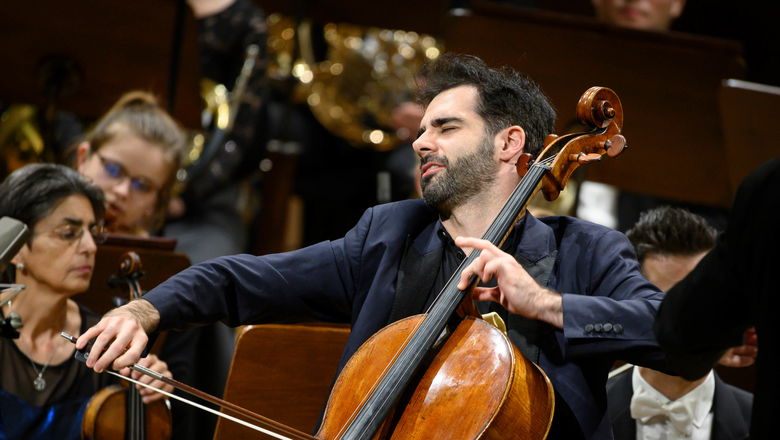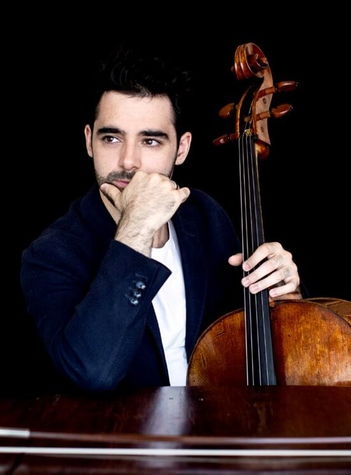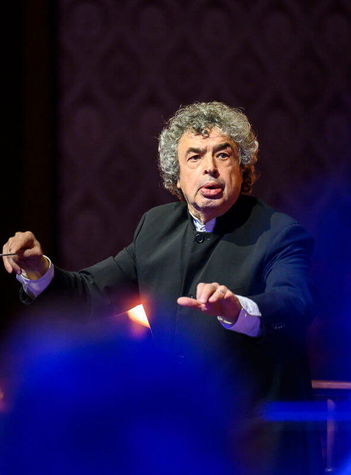Programme
Antonín Dvořák
Othello, concert overture, Op. 93 (15')
Antonín Dvořák
Cello Concerto in B minor, Op. 104 (40')
— Intermission —
Antonín Dvořák
Symphony No. 7 in D minor, Op. 70 (37')
Secure your seat for the 2025/2026 season – presales are open.
Choose SubscriptionLike the season’s opening concert, the first concert of Series B also consists of works by Antonín Dvořák. Chief conductor Semyon Bychkov has chosen one of the concert overtures and an important late symphony, and to perform the great Cello Concerto, he has invited the young Spanish virtuoso Pablo Ferrández.
Subscription series B | Duration of the programme 1 hour 55 minutes
Antonín Dvořák
Othello, concert overture, Op. 93 (15')
Antonín Dvořák
Cello Concerto in B minor, Op. 104 (40')
— Intermission —
Antonín Dvořák
Symphony No. 7 in D minor, Op. 70 (37')
Pablo Ferrández cello
Semyon Bychkov conductor
Czech Philharmonic

Pablo Ferrández cello

The Spanish cellist Pablo Ferrández, now 32 years old, was destined from birth for a brilliant musical career. Both of his parents were also musicians, and they named their child for the iconic Spanish cellist Pablo Casals. Ferrández soon showed himself to be worthy of the name: he turned out to be a prodigy, making the impression of a “trained” cellist at age three, starting to make public appearances at age nine, and making his debut with the Spanish National Orchestra at age 12. He is said to have been a very disciplined child, and he was unaware of his exceptional nature because he was constantly immersed in his work.
At age 13 he began studying at the prestigious Escuela Superior de Música Reina Sofía under Natalia Shakhovskaya, a student of the great Mstislav Rostropovich, whose interpretive tradition Ferrández is following to a considerable extent. Ferrández then continued his musical education at the Kronberg Academy in Germany. Of course, his musical career would not be where it now is had it not been for two circumstances: victory at the famed Tchaikovsky International Competition (2015) and meeting Anne-Sophie Mutter, who took him under her wing as a scholar of her foundation. That not only put Ferrández in contact with his musical idol, who has since passed on many of her skills to him, but also earned him a large number of opportunities to perform in great concert halls including appearances alongside Anne-Sophie Mutter.
That is also how Ferrández first came to the Rudolfinum last January with Anne-Sophie Mutter, the Czech Philharmonic, and Manfred Honeck, excelling in Brahms’s Double Concerto. And today, we are fortunate to have a live recording of that successful concert. The acclaim was so tempestuous that Pablo Ferrández immediately received the offer to perform here again. He had no idea it would be so soon: already in September he stood in at the opening of the Dvořák Prague Festival in Dvořák’s great Cello Concerto. Despite his youth, he has already played the work on today’s programme countless times, and he included it on his first recording. According to some of the world’s critics, with Dvořák Ferrández has become “a cellist of stature” (The Guardian), and Czech critics have also been unsparing in their praise.
Ferrández and the Czech Philharmonic are taking Dvořák to Japan at the turn of October and November, and he will also be appearing on the March tour of Europe with the Czech Philharmonic in Spain, Germany (on 19 March you can wish him a happy birthday at the concert in Munich), and France. This year, he will get quite a few chances to enjoy the masses of orchestral sound that he loves during his solo appearances: on his busy calendar are several debuts with American orchestras in Boston, Cleveland, San Francisco, Pittsburgh, and other important cities as well as concerts with the already familiar faces of the London Philharmonic Orchestra and the Orchestre National de France. A “New genius of the cello” (Le Figaro), he is conquering the world with his 1689 Stradivarius.
Semyon Bychkov conductor

In addition to conducting at Prague’s Rudolfinum, Semyon Bychkov and the Czech Philharmonic in the 2023/2024 season, took the all Dvořák programmes to Korea and across Japan with three concerts at Tokyo’s famed Suntory Hall. In spring, an extensive European tour took the programmes to Spain, Austria, Germany, Belgium, and France and, at the end of year 2024, the Year of Czech Music culminated with three concerts at Carnegie Hall in New York.
Among the significant joint achievements of Semyon Bychkov and the Czech Philharmonic is the release of a 7-CD box set devoted to Tchaikovsky’s symphonic repertoire and a series of international residencies. In 2024, Semjon Byčkov with the Czech Philharmonic concentrated on recording Czech music – a CD was released with Bedřich Smetanaʼs My Homeland and Antonín Dvořákʼs last three symphonies and ouvertures.
Bychkovʼs repertoire spans four centuries. His highly anticipated performances are a unique combination of innate musicality and rigorous Russian pedagogy. In addition to guest engagements with the world’s major orchestras and opera houses, Bychkov holds honorary titles with the BBC Symphony Orchestra – with whom he appears annually at the BBC Proms – and the Royal Academy of Music, who awarded him an Honorary Doctorate in July 2022. Bychkov was named “Conductor of the Year” by the International Opera Awards in 2015 and, by Musical America in 2022.
Bychkov began recording in 1986 and released discs with the Berlin Philharmonic, Bavarian Radio, Royal Concertgebouw, Philharmonia Orchestra and London Philharmonic for Philips. Subsequently a series of benchmark recordings with WDR Symphony Orchestra Cologne featured Brahms, Mahler, Rachmaninov, Shostakovich, Strauss, Verdi, Glanert and Höller. Bychkov’s 1993 recording of Tchaikovsky’s Eugene Onegin with the Orchestre de Paris continues to win awards, most recently the Gramophone Collection 2021; Wagner’s Lohengrin was BBC Music Magazine’s Record of the Year (2010); and Schmidt’s Symphony No. 2 with the Vienna Philharmonic was BBC Music Magazine’s Record of the Month (2018).
Semyon Bychkov has one foot firmly in the culture of the East and the other in the West. Born in St Petersburg in 1952, he studied at the Leningrad Conservatory with the legendary Ilya Musin. Denied his prize of conducting the Leningrad Philharmonic, Bychkov emigrated to the United States in 1975 and, has lived in Europe since the mid-1980’s. In 1989, the same year he was named Music Director of the Orchestre de Paris, Bychkov returned to the former Soviet Union as the St Petersburg Philharmonic’s Principal Guest Conductor. He was appointed Chief Conductor of the WDR Symphony Orchestra (1997) and Chief Conductor of Dresden Semperoper (1998).
Antonín Dvořák
Othello, concert overture, Op. 93
The orchestral compositions by Antonín Dvořák on today’s programme were written in the 1880s and ’90s, a period that includes Dvořák’s stay in New York (1892–1895). How do these three works cross paths with the American chapter in the life of one of the greatest Czech composers?
The concert overture Othello, Op. 93 (B174) dates from the turn of 1891 and 1892 and constitutes the final part of a cycle of overtures titled Nature, Life, and Love, which were originally to have been the composer’s Opus 91 and were meant to be played together as a whole. It was in this form that Dvořák conducted the work’s premiere at the Rudolfinum on 28 April 1892 with the orchestra of the National Theatre augmented by students from the conservatoire. The concert from the “farewell tour” preceding the composer’s departure for his new job at the conservatoire in New York got a very positive reception. The famous music critic Emanuel Chvála described the new work as being “explicitly programmatic”, in the case of Othello (Love) marked by “an expression of demonic passion”. Listeners noticed the ideas and motifs shared between the individual overture and the composer’s melodic inventiveness. It was as if everything were related: the beauty of nature, the pageant of life, and ill-fated love. At Carnegie Hall on 21 October 1892, for his American debut in the role of a composer and conductor, Dvořák again performed the entire triptych of concert overtures along with his Te Deum, Op. 103 (B176), which was heard for the very first time. The titles of the overtures changed gradually, and it was not until they appeared in print (Simrock, Berlin 1894) that the works got their definitive titles and opus numbers: In Nature’s Realm, Op. 91, Carnival Overture, Op. 92, and Othello, Op. 93. The publisher entrusted Johannes Brahms with editing the scores before they were printed because the composer was across the ocean at the time but gave his complete approval.
Antonín Dvořák may have seen the play The Tragedy of Othello, the Moor of Venice by William Shakespeare (1564–1616) on the stage of the National Theatre, where it was in the repertory from 1887 until 1896 in a production directed by Josef Šmaha that used a Czech translation by Jakub Malý. In whatever context he may have discovered the play, the drama about love’s destructive power captivated him, as can be seen from his comments on the action inscribed in the autograph score and from the musical reminiscences of the characteristic death motif from his own Requiem, Op. 89, at the moment when “Othello, at the height of rage, murders her [Desdemona]”. Dvořák had written an earlier, no longer extant overture Romeo and Juliet, and there is a mention of an opera libretto for Viola (Twelfth Night) supposedly offered to the composer by the Court Opera in Vienna, but the overture Othello is Dvořák’s only preserved work with inspiration from Shakespeare.
Antonín Dvořák
Cello Concerto in B minor, Op. 104
At the end of his stay in America, Antonín Dvořák wrote his Cello Concerto in B minor, Op. 104 (B191), his most famous work in the genre alongside his concertos for piano (G minor, Op. 33) and violin (A minor, Op. 53). Yet he had long regarded the cello, an instrument that supposedly “whines up high and mumbles down low”, as unsuitable for solo playing, and he basically discarded his first, youthful attempt at writing a cello concerto. His opinion of the cello changed under the influence of wonderful performers: Hanuš Wihan, with whom he had played in a piano trio during his “farewell tour”, and the American composer and cellist Victor Herbert, Dvořák’s colleague at the conservatoire in New York. Dvořák was truly captivated by Herbert’s Cello Concerto in E minor, Op. 30 (1894). He began work on sketches for his own concerto in B minor on 8 November 1894, just ten days later he began orchestrating it, the score was finished on 9 February 1895, and he made a major revision to the finale after returning to Bohemia.
The concerto consists of the usual three movements: the opening Allegro is composed in sonata form, the second movement (Adagio ma non troppo) is warmly lyrical, and the third movement (Finale. Allegro moderato) has the layout of an extended rondo with motivic connections to both preceding movements. The whole concerto exudes a sense of melancholy and desire for the homeland and for family. At the same time, there is an awareness of the impending return from the labyrinth of the world to the paradise of the heart; the music is very emotional and full of beautiful melodies as well as wonderful orchestration. It is no exaggeration to call it one of the most admired compositions of its genre. Dvořák himself was aware of the concerto’s exceptional qualities, referring to it in a letter to Josef Bohuslav Foerster as a work that brought him “outrageous joy” and that decidedly exceeds his two earlier concertos in importance. The cello and orchestra become such equal partners that the concerto has sometimes been described as Dvořák’s tenth symphony. The music’s intimate message is highlighted by a motif from Kéž duch můj sám (Leave Me Alone), a song in Dvořák’s cycle Four Songs, Op. 82 that was a particular favourite of the composer’s sister-in-law Josefina Kounicová. The motif is heard in the second movement and again in the finale, which was revised after Josefina’s death in May 1895.
The English cellist Leo Stern played the concerto’s premiere on 19 March 1896 in London with the Philharmonic Society under Antonín Dvořák’s baton. Stern studied the new concerto very diligently, being aware that it “is quite unlike any other cello concerto” and “is very difficult as regards intonation”. He acquitted himself honourably, however, so he also played the premieres in Prague (11 April 1896) and elsewhere. Although the Cello Concerto is dedicated to Hanuš Wihan, Prague audiences never heard him play it, a fact explained in part by a dispute over a cadenza, which Wihan wanted to add to the concerto, but which Dvořák resolutely refused. Mostly at fault, however, was Wihan’s busy schedule with commitments to the Bohemian Quartet and the Prague Conservatoire.
Antonín Dvořák
Symfonie č. 7 d moll op. 70
American audiences became familiar with Dvořák’s Symphony No. 7 in D minor, Op. 70 (B141, 1884–1885) mainly thanks to the Hungarian-German conductor Arthur Nikisch, who programmed it on a tour of the USA in 1891. It is peculiar that Dvořák did not programme his symphony on any of the concerts he conducted in America, unlike his Sixth and Eighth, but he did conduct the world premiere on 22 April 1885 at London’s St. James Hall with great success. The work had been commissioned by London’s Royal Philharmonic Society, of which Dvořák was made an honorary member in 1884.
Emanuel Chvála, quoted above in connection with Othello, asserted that “there is only exceptionally room for a gloomy mood in his [Dvořák’s] symphonies … a rare aberration, in fact a unique phenomenon, is the Symphony in D minor, which vibrates with powerful emotional excitement.” The sombrely dramatic tone truly contrasts with Dvořák’s amiable Sixth Symphony from his “Slavonic period”. This has led to a variety of interpretations. Around 1885, did Dvořák find himself in a crisis, dealing with tension between his patriotically oriented composing and his efforts to establish himself fully on concert stages abroad? Or was he feeling the urge to follow the symphonies of Beethoven and Brahms as models? Just at the time when he was composing and publishing his Seventh Symphony, thoughts of a fundamentally existential character are formulated in his correspondence, and one senses that such thoughts are given musical expression in this work. Formally, the composition follows the usual four-movement layout with the first movement (Allegro maestoso) and finale (Allegro) in sonata form, a calmer second movement (Poco adagio), and a scherzo (Vivace) in A-B-A form as the third movement. Supreme command of musical structure along with depth of ideas and masterful handling of thematic material make Dvořák’s Seventh Symphony one of the greatest symphonies ever written.
Like the season’s opening concert, the first concert of Series B also consists of works by Antonín Dvořák. Chief conductor Semyon Bychkov has chosen one of the concert overtures and an important late symphony, and to perform the great Cello Concerto, he has invited the young Spanish virtuoso Pablo Ferrández.